Why are Angela Merkel and Stephen Harper really meeting in Ottawa?
Aug 15th, 2012 | By Counterweights Editors | Category: In Brief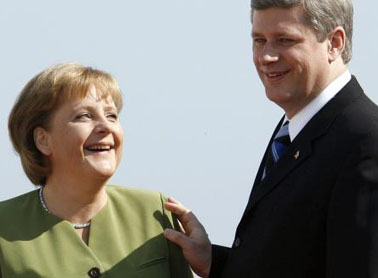
German Chancellor Angela Merkel welcomes Canadian Prime Minister Stephen Harper as he arrives for the first working session of G8 Heads of State 07 June 2007 at the Kurhaus building in Heiligendamm, northeastern Germany.
Having spent a few weeks, a few months ago, visiting various parts of Europe with a few thousand mostly congenial Germans, we can appreciate the superficial motivations behind German Chancellor (ie Prime Minister) Angela Merkel’s visit with our Canadian PM Harper and others in Ottawa and vicinity today and tomorrow. (See “Euro crisis ‘elephant in the room’ for Harper-Merkel talks.”)
At first, however, the deeper motivations eluded us. According to the English language website of “Deutsche Welle … Germany’s international broadcaster,” Ms. Merkel is now “back from her vacation. The euro zone crisis is just one of many problems waiting in the wings for her. But near the top of her agenda this week is a business trip to Canada … In recent years, Canada has become a popular holiday destination for Germans … The relationship with NATO ally Canada is traditionally problem-free; Canada’s political culture is more similar to that of European neighbors than to that of the United States … The trip to Canada can be seen as a sign that Merkel isn’t letting the euro crisis get the better of her.”
All this is nice enough, of course, but vague at best. According to (a somewhat contradictory account in?) the Wall Street Journal : “The euro-zone crisis and negotiations for a Canada-European Union free trade pact will likely top the agenda when Canadian Prime Minister Stephen Harper and German Chancellor Angela Merkel meet over the next two days … Mr. Harper will host a private dinner for the German leader late Wednesday at his summer residence … in Gatineau, Quebec. There will be further discussions in Ottawa Thursday, and probably a joint press conference after that. Mr. Harper’s office hasn’t released a formal schedule.”
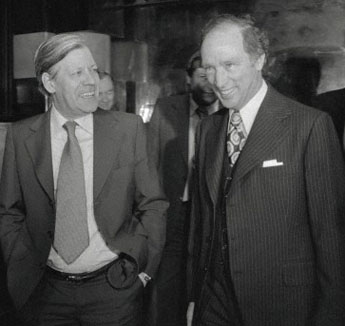
What a difference 35 years makes : West German Chancellor Helmut Schmidt (L) with Canadian Prime Minister Pierre Trudeau, following their meeting at the Savoy Hotel in London, May 8, 1977.
The trouble with this interpretation, it would seem, is that Germany is already somewhat annoyed with Canada’s somewhat sanctimonious preaching about the Euro crisis. (And besides, again, according to German sources [see Deutsche Welle above] : “The trip to Canada can be seen as a sign that Merkel isn’t letting the euro crisis get the better of her.”) It seems clear as well that “negotiations for a Canada-European Union free trade pact” are now in the hands of a pan European officialdom over which Ms. Merkel has modest influence at best. (Although hope also still appears to spring eternal in some Ottawa breasts. See “Tories counting on Merkel’s support to turn tide on free-trade deal” – hastily erected on the Globe and Mail website just after 10 PM tonight! For a different point of view, posted on the same site on August 17, see “Video: Lots of smoke but little fire in Canada-EU trade talks.”)
* * * *
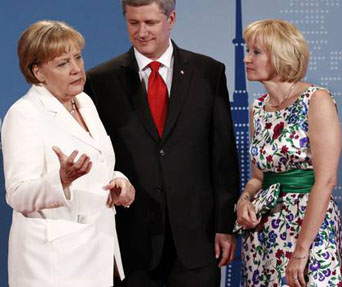
The last time Ms Merkel was in Canada : Germany's Chancellor Angela Merkel (L) is greeted by Canada's Prime Minister Stephen Harper and his wife Laureen as she arrives at the G20 Summit in Toronto, June 26, 2010. (Jim Young/Reuters).
A brief report from “Embassy … Canada’s influential foreign policy newspaper” points to some slightly more convincing, down-to-earth rationale: “Two German firms who have expressed interest in Canadian potash and shipbuilding are among the delegation accompanying German Chancellor Angela Merkel to Canada … Ms. Merkel is set to meet with Prime Minister Stephen Harper on Canadian soil for ‘frank’ yet ‘friendly’ discussions starting Aug. 15, says the German Embassy. Its tentative list of firms joining Ms. Merkel on her visit include zinc and sulfur…”
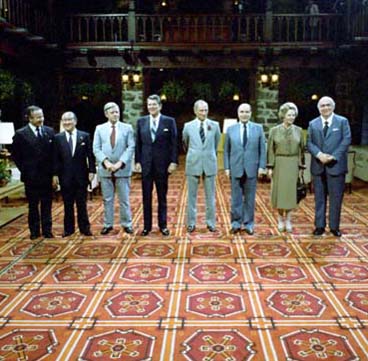
G7 leaders at the Chateau Montebello in Ottawa, July 20, 1981. From left to right: Gaston Thorn, Zenko Suzuki, Helmut Schmidt, Ronald Reagan, Pierre Trudeau, Francois Mitterrand, Margaret Thatcher, Giovanni Spadolini.
Even this, however, still leaves most of us here wondering … And the lately (and once again) increasingly ubiquitous John Ibbitson has already explained why Ms. Merkel is definitely not interested in a euro-crisis resolution that would see “Germany and other northern European ‘have’ states … end up bleeding money year after year to ‘have not’ states in southern Europe,” such that the “euro zone could become, in effect, a mirror image of Canadian federalism, with the Mediterranean playing the role of Quebec and the Maritimes.” (And then again, even the Europe of the euro zone is not yet quite a democratic “country,” even in the somewhat limited – or “post national”? – manner of the present bilingual and multicultural confederation in Canada.)
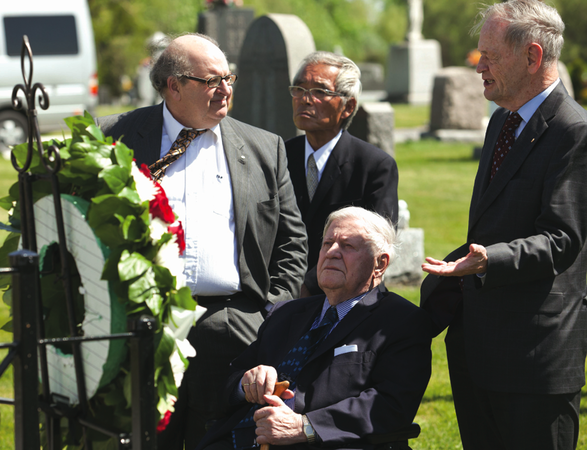
Former heads of state and government gathered following the InterAction Council Annual Plenary Meeting held in Quebec City on May 28 to pay tribute to one of their old colleagues. IAC Secretary-General Thomas Axworthy, the former German Chancellor Helmut Schmidt, the former Prime Minister of Canada Jean Chretien and former Minister of Justice of Japan Seiken Sugiura, paused to honour former Canadian Prime Minister Pierre Elliott Trudeau with a moment of silence in front of the Trudeau family mausoleum, where he is interred, close to Montreal.
Then, finally, we see an explanation that looks (to us at any rate) far more like the nirvana of deeper truth that we are looking for. Another article on the Deutsche Welle website today – by “Canada specialist Petra Dolata” from King’s College in London – rings some more convincing realpolitikal notes. It is entitled “Diverging interests could strain German-Canadian ties.” And it ends with:Â “Germany … seems to be disillusioned with Canada. Ottawa’s withdrawal from the Kyoto Protocol last year, the ongoing discussions about environmental problems relating to the oil sands in Alberta … have played a major role in this … Merkel’s problems are located in Europe and Germany … The transatlantic relationship does not offer solutions to the euro crisis and domestic challenges … as Canada looks towards Asia and the emerging markets of Brazil and India, the relationship could transform from one of benign neglect to a more troubled friendship … Gone are the days when the heads of Germany and Canada met in the summer … [to] … holiday together as Helmut Schmidt and Pierre Trudeau did … Merkel’s holidays are over.”
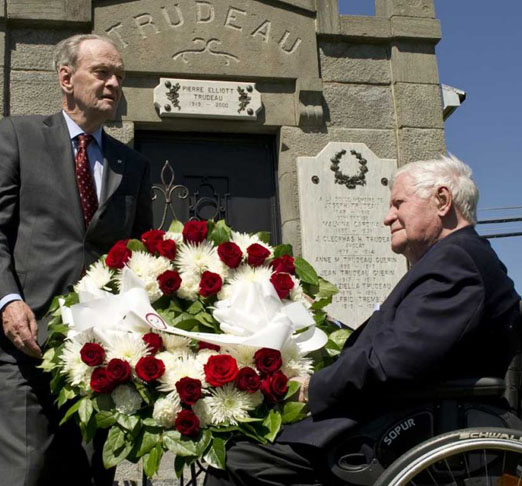
Plusieurs personnalités publiques ont effectué un pèlerinage à la tombe de l'ancien chef d'État canadien, incluant l'ex-premier ministre Jean Chrétien et Helmut Schmidt, chancelier de la République fédérale de l'Allemagne de 1974 à 1982, Hune 1, 2011. PHOTO LA PRESSE CANADIENNE.
Mmmm. Very interesting. And here, on this side of the Atlantic, “holiday together as Helmut Schmidt and Pierre Trudeau did” just may say quite a lot about PM Harper’s deepest motivations as well. Mr. Harper may or may not really believe that Pierre Trudeau ruined Canada, but he is still trying to measure up to him. Ms Merkel’s holidays may be over. But she is briefly visiting Ottawa before getting back to business back home in Berlin (and without subsequently visiting the United States). Chancellor Merkel and PM Harper are both conservatives of one sort or another – just as Helmut Schmidt and Pierre Trudeau were both on the other side of the free and democratic ideological wall. And maybe Stephen Harper will finally get the kind of Canada-Europe trade agreement that Trudeau also wanted – and that didn’t work then, and probably won’t work now either!

